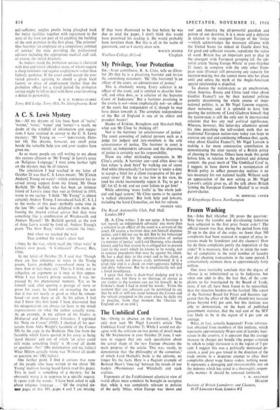A C. S. Lewis Mystery SIR,—All my dreams of late
1%ve been of 'weirs,' 'worms,' wires,"waves' and 'nerves'—a result, no doubt of the windfall of information and sugges- tions I have received in answer to the C. S. Lewis mystery: 'Mr Young on —' (SPECTATOR, Octo- ber 14). The dreams, however, are small price beside the valuable help you and your readers have given me.
As so many people are still writing to me about this curious allusion to `Mr Young' in Lewis's essay on 'Religious Language,' I trust some further light on the mystery may be of interest.
The conclusion I had reached in my letter of October 28 was that C. S. Lewis meant: `Mr [Canon Andrew] Young on weirs'—which conclusion has re- ceived strong support from my friend, Mr Owen Barfield. Mr Barfield, who has been an intimate friend of Lewis's since they met at Oxford in 1919, wrote to me saying: 'I think "Mr Young" is almost certainly Andrew Young. I introduced Jack [C. S. L.] to the works of this poet—probably some time in the late '40s—and be was delighted with them, de- livering the shrewd critical apereu that they were something like a combination of Wordsworth and Andrew Marvell.' Mr Barfield quoted, as the sort of thing Lewis would be fond of, Andrew Young's poem 'The Slow Race,' which contains the lines: And when we reached the weir That combed the water's silver hair —lines, by the way, which recall the 'silver weirs' in Lewis's own poem, 'A Confession' (Poems; Bles, 1964).
In my letter of October 28, I said that 'Though there are few references to weirs in the Young poems, Lewis probably remembered more to be there than in fact there are.' This is, I think, not so subjective an argument as it may at first appear. While I was Lewis's private secretary, I was im- pressed by his phenomenal memory. Yet, as he himself said, after quoting a passage of verse or prose for years, he found on re-reading the text that it was not nearly so good as what he remem- bered—or even there at all. As his editor, I feel that I know this first hand. I have discovered that his misquotations are always (at least, to my mind) improvements on what the author actually wrote. As an example, in my edition of his Studies in Mediaeval and Renaissance Literature, I reprinted his 'Note on CO/7711S' (1932). I checked all his quo- tations from Aldis Wright's facsimile of the Comas MS by the copy in the Bodkian. One line from the facsimile which Lewis quoted in his essay as being 'good theatre' and out of which 'an actor could still make something lively' is 'Beyond all doubt or question—No!' (His punctuation and my italics.) What Milton actually wrote was 'Without all doubt or question, no.' (My italics.)
One further point. I find it curious that none of the people who have written to me about `Mr Young' mention having heard Lewis read this paper. This in itself is something of a mystery, for he obviously wrote it in response to a specific request. It opens with the words: 'I have been asked to talk
about religious language . . Of the original six- teen pages of this MS, pages 4 and 5 are missing.
If they were discovered to be lost before he was due to read the paper, I don't think this would have prevented his reading it. He would probably have rewritten them. But this is all in the realm of guesswork, and so I sternly draw rein.
WALTER HOOPER






































 Previous page
Previous page